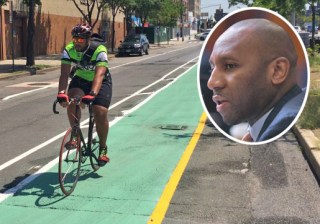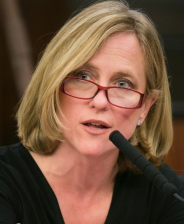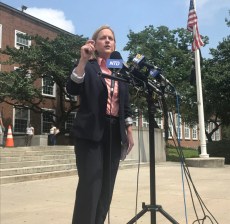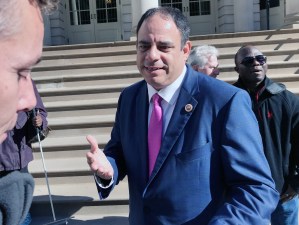Queens Borough President Reappoints Community Board Member Who Said Pedestrians ‘Deserve’ to Die
But Donovan Richards seeks to prevent such utterances with a new Code of Conduct for board members.
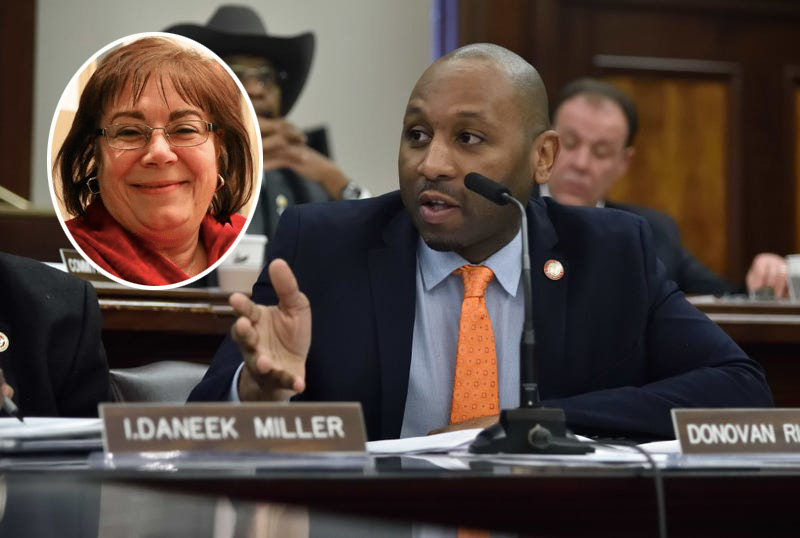
Queens Borough President Donovan Richards reappointed a controversial member of a community board who once said that some pedestrians “deserve” to die — even as he unveiled a slate of reforms this week to ensure that community boards better represent the communities they’re supposed to serve, not just the loudest people, who have historically been wealthy, White, and older car-owners, in favor of people of color, lower-income residents, and people who rely on public transit.
Richards’s reappointment of Flushing resident Kim Ohanian to Community Board 7 came as a shock, given Ohanian’s comments at a May, 2019, public meeting — comments that then-Council Member Richards condemned and said would not be tolerated if he got the borough’s top job.
“I gotta be honest with ya, Vision Zero is a joke,” Ohanian had said about a Department of Transportation bike lane proposal in her neighborhood. “I’ve watched people cross the street while they’re still talking on their damn phones. You know what, they deserve to get run over.”
“Bye-Bye. No place for you serving on the community board!!!” Richards tweeted amid a backlash from safe-street advocates after the comments by Ohanian, who earns $115,000 as an analyst for the city Department of Environmental Protection.
But that was then: Shortly after becoming borough president, Richards re-appointed Ohanian for another two-year term that started on April 1, Richards’s office confirmed.
A Queens resident who tweets under the pseudonym Diedrich vanVlissingen — whose posts about the lack of diversity on Queens community boards partly inspired Richards to make changes — was shocked that Ohanian was reappointed.
“Mayor de Blasio himself said her words were unacceptable and candidate Richards was right to say that Ohanian is unfit to serve. I wish Richards followed his own advice and rejected her recommendation — it would set a strong tone and example for board members in the future,” said the anonymous poster.
.@DrichardsQns in 2019 you said you would not reappoint Kim Ohanian the CB7 member who said "You know what, [pedestrians] deserve to get run over"
Do you still stand by that position? https://t.co/XJuD2gTa6S— Diedrich vanVlissingen (@VlissingenVan) February 19, 2021
Richards did not bring up Ohanian at his virtual presser on Tuesday, but said going forward that such comments would warrant removal.
“We have a clear process on the code of conduct. In a case like this, I deem this extreme, I deem this as a threat,” Richards said. “In instances where there are complaints, we’re gonna look at each situation individually. You will be removed if we hear anything like this in the future.”
He added that so far during his time in the office he has not received any formal complaints about any members. The new code of conduct went into effect on April 1 and it applies only to conduct since that date.
“Borough President Richards reiterates that he will have zero tolerance for harassment, abuse, or threats at community board meetings,” said Richards’s spokeswoman, Breeana Mulligan. “With respect to reappointments, the borough president approached them equitably: if a member was nominated by their Council Member, eligible for reappointment, and in good standing with their board, then they would be reappointed.” (It’s worth noting that Ohanian’s comments did not occur at a community board meeting, but at a civic group meeting.)
Bye-Bye. No place for you serving on the community board!!!
— Donovan Richards Jr. (@DRichardsQNS) July 19, 2019
Richards’s reappointment of Ohanian threatened to overshadow the borough president’s announcement on Tuesday of a slate of community board reforms that includes establishing a Code of Conduct that outlines the rules and responsibilities of board members; requiring that every community board member complete a three-session training course offered by the New York City Commission on Human Rights; and calling on each of the 14 boards to establish a bylaw revision committee this month in order to “promote modernization and uniformity.”
Any member who violates the code of conduct by harassing, abusing, or threatening another board member or member of the public could be booted from the board, Richards said.

In all, Richards appointed 373 board members this year — 110 of whom are new to community boards, with the remainder reappointments. (Another 330 or so community board members are up for reappointment next year).
Richards said his goal is for the civic panels to represent Queens’s diversity, not just its people, but how people get around, such as by public transit or bike. As such, 83 of the new appointees are people of color; 75 of the new appointees said they use the subway or train (and 54 use the bus), while 23 said they used a bicycle or scooter, Richards’s office said.
“We talk about reimagining our streets, our transportation network here in Queens, it’s very important to have a diverse set of voices at the table,” Richards said. “Not everybody drives. You can see the generational gap when you look at who drives and who doesn’t. Theres always been this notion in the borough that nobody cycles, people drive everywhere, but the facts based on the applications we got, we’re seeing that drastically change.”
The city often relies on community board support or approval before implementing transit projects, like bike and bus lanes, which is why it’s so crucial to make sure the boards have adequate representation of public transit users, Richards said, citing pushback years ago on the Select Bus Service project for Woodhaven Boulevard. The car-centric community board fought back against the project, claiming that no one rides the bus, despite MTA stats that show that actually a majority 52 percent of Queens residents rely on public transit, and at least 11 percent commute primarily by bus.
“When we did the SBS on Woodhaven Boulevard, a lot of individuals who would say, ‘No, no everybody drives.’ But we know a majority take public transit or cycle,” he said. “Individuals pointed to big impacts to getting to the doctor and we found that to not be true. It not only sped up bus times, but was also able to ensure everybody could get to where they needed to go.”
The Queens Daily Eagle, along with advocates, have long documented the lack of diversity across Queens’s 14 community boards, revealing their racial, ethnic and gender disparities. For example, Latino residents comprise just one-quarter of Community Board 3 despite accounting for two-thirds of the population in that district, which covers Jackson Heights, Corona and East Elmhurst, the Eagle reported in January.
And despite immigrants making up about half the population of Queens, the immigrant community represented no more than 14 percent of any single board, the Eagle reported; specifically, no member of Community Board 4 self-identified as an immigrant, despite immigrants making up 64 percent of the population in that district, the Eagle reported. Those disparities prevail among the Black, Asian and South Asian, and LGBTQ communities, according to the Eagle — patterns that Richards said led to his reforms.
Richards said he tried to appoint new members that would help community boards look more like their actual communities — of the 110 first-time appointees this year, 62.4 percent are women, which he said is a massive 20.2-point increase from the current rate. And this year’s 110 new appointees better represent communities of color — 24.8 percent self-identify as Latinx, 17.4 percent as immigrant, 11 percent as East Asian/Pacific Islander, 14.7 percent as South Asian, 24.8 percent as African American, and 8.3 percent as LGBTQIA+, according to the borough president’s office.
“Queens has never been closer to community board representation that is truly reflective of our borough’s vast diversity than it is today. Thank you to the over 900 applicants who heard the call of community service and congratulations to all who have been appointed. Queens looks forward to all you will accomplish on behalf of our families,” said Richards. “Democracy is at its strongest when the voices of all the people it serves are elevated, a principle we are proud to strive toward with this new class of appointees.”
